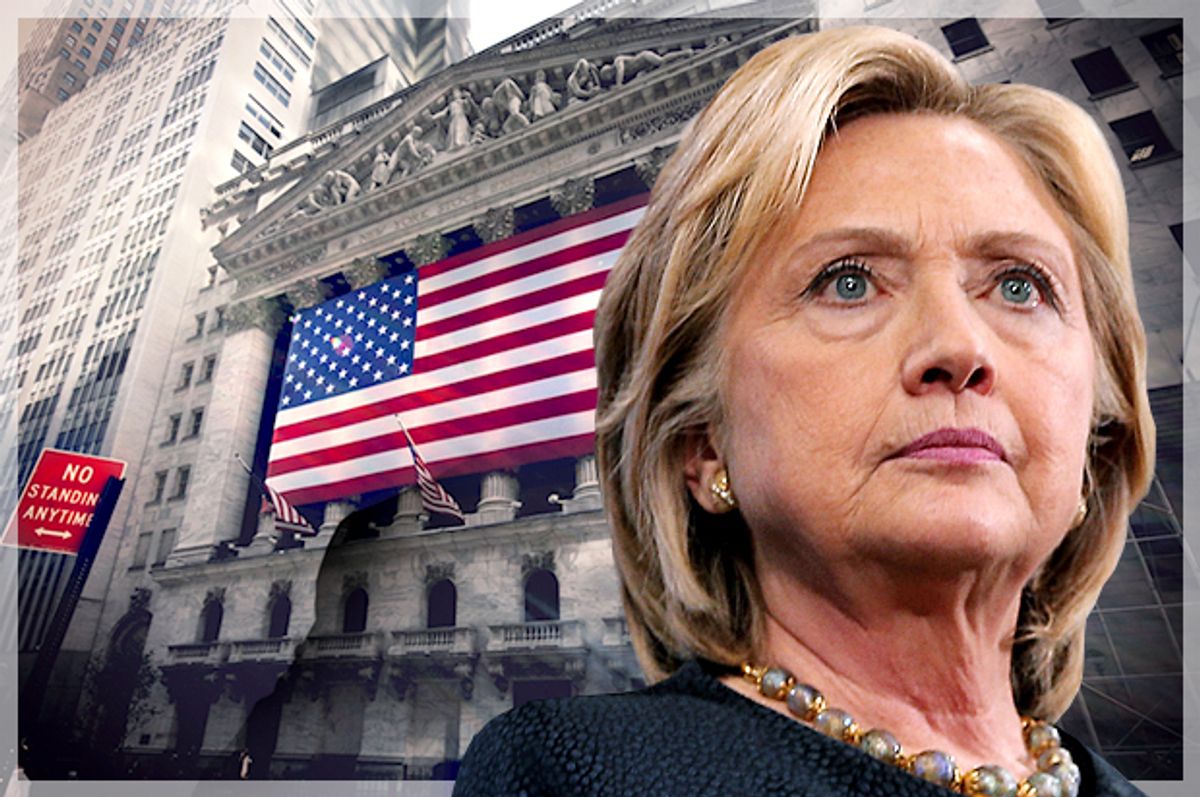A newly leaked email shows that the Hillary Clinton campaign proposed "selectively providing" the press with Clinton's paid speeches to Wall Street and manipulating the media coverage to make her look less supportive of Wall Street than she actually is.
In response to the Bernie Sanders campaign and left-wing critics, Clinton pledged in the February presidential debate to "look into" releasing the transcripts of her paid speeches to Wall Street, which she had given at private events that were closed to the press.
After more than 250 days, Clinton still has not fulfilled her promise — but WikiLeaks released excerpts of her paid speeches this week that show Clinton saying she "represented" and "had great relations" with Wall Street.
Among other documents recently released by WikiLeaks is a revealing email by Dan Schwerin, the director of speechwriting for Clinton. Citing the growing backlash to Clinton's Wall Street alliance, Schwerin sent a message to fellow staffers in November 2015 proposing a strategy.
Clinton had given a paid speech in New York City in October 2014 for the German bank Deutsche Bank. Schwerin explained, "I wrote her a long riff about economic fairness and how the financial industry has lost its way, precisely for the purpose of having something we could show people if ever asked what she was saying behind closed doors for two years to all those fat cats."
"Perhaps at some point there will be value in sharing this with a reporter and getting a story written," he continued. "Upside would be that when people say she's too close to Wall Street and has taken too much money from bankers, we can point to evidence that she wasn't afraid to speak truth to power. Downside would be that we could then be pushed to release transcripts from all her paid speeches, which would be less helpful."
A few days later, sent a follow-up message, noting that Clinton was getting critical media coverage of her close ties to Wall Street. The New York Times had just published an article on her "Wall Street image problem," and AP was likewise working on a story. noted that AP reporter Lisa Lerer had asked the Clinton campaign if it would like to describe Clinton's paid speeches to banks in any way.
"I think we could come up with a vanilla characterization that challenges the idea that she sucked up to these folks in her appearances," continued.
After that, he argued that the Clinton campaign could "then use AP's raising of this to our advantage to pitch someone to do an exclusive by providing at least the key excerpts from this Deutsche Bank speech. In doing so, we could have the reporting be sourced to a 'transcript obtained by [news outlet]' so it is not confirmed as us selectively providing one transcript while refusing to share others."
was articulating a strategy to try to cover the tracks, to make it look like the Clinton campaign was being transparent while it was admittedly "refusing" to release the Wall Street speech transcripts, and manipulating the media in order to do so.
Not everyone in the Clinton camp thought this strategy would work. Mandy Grunwald, an adviser and close Clinton ally, replied, "I am concerned that the passage below will exacerbate not improve the situation."
Grunwald pointed out that, even in this weaker speech, Clinton implied that it is not actually true that the economic system is rigged against the working class, only that Americans believe that.
Top Clinton adviser Jake Sullivan seemed more interested. "Could we just get someone to say she quoted Duffy and Carney to them, to the effect that Wall Street had lost its way?" he wrote in response.
Also included in the email thread was John Podesta, the chair of Clinton's presidential campaign.
Whistle-blowing journalism organization WikiLeaks released thousands of emails to and from Podesta this week. There do not appear to be any more replies to this message in the trove.
The Clinton campaign has neither confirmed nor denied the authenticity of the emails, but Clinton herself confirmed to reporters that the excerpts of her paid speeches to Wall Street that were included in one of the leaked messages are real. The Clinton campaign has blamed the leak on Russia.
Among the thousands of pages of newly released documents were excerpts of Clinton's Wall Street speeches. In these speeches, for which she was paid hundreds of thousands of dollars each, Clinton acknowledged that she is "far removed" from the middle class, insisted "there is such a bias" against "successful" people, claimed it is "oversimplification" to blame big banks for the 2008 economic collapse and maintained that she "did all I could to make sure they continued to prosper."
Wall Street has thrown its weight behind Clinton, pouring money into her campaign.



Shares